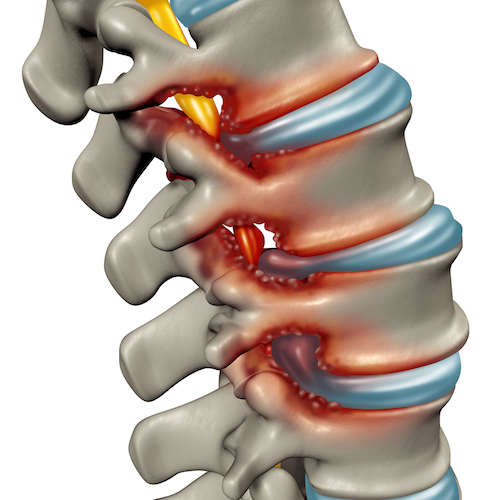What is a disc?
The spine is composed of 33 vertebrae, or bones, that are stacked on top of each other giving us our upright posture. It is in between 24 of these vertebra that a piece of cartilage, or intervertebral disc, lies to provide cushion to the spaces between each bone.
Intervertebral discs are often described as “jelly donuts”. The outer portion of the disc, rubbery in substance, is the annulus fibrosus. The inner portion of the disc acting to “fill the hole” of the donut is a gelatin-like substance, the nucleus pulposus.
A healthy disc is soft, flexible, and helps to absorb shock and the daily forces that act on the spine.
What is a herniated disc?
When abnormal or increased stress is applied to the spine, the outer and much tougher part of the disc, the annulus fibrosus can tear. As a result, the gelatin-like nucleus pulposus can then leak through the tear. This “leak” or “bulge” of the disc is referred to as a herniated disc.
This herniation, often mistakenly referred to as a “slipped disc” can be caused by direct trauma or long term pressure on the spine.
How does it feel?
Symptoms of a herniated disc may result in pain, numbness, tingling or weakness in the neck, back, arms or legs. The type and location of symptoms experienced depend on the location and the direction of the herniation. Additionally, if the “bulging” or “leaking” disc pushes on a nearby nerve, muscle weakness or pain may occur. If it is not in contact with a nerve, the individual could even remain asymptomatic and the condition may go undiagnosed.
The following symptoms may be reported with a disc herniation:
- Pain in the neck, back, low back, arms or legs
- Inability to bend or rotate the neck/back
- Numbness or tingling in the neck, shoulders, arms, hands, hips, legs, or feet
- Weakness in the arms or legs
- Limping when walking
- Increased pain when coughing, sneezing, reaching or sitting
- Inability to stand up straight; forward or leaning posture
- Difficulty getting up from a chair
- Inability to assume one position for a long period of time
- Pain that is worse in the morning
How can I prevent a herniation?
To help prevent experiencing a herniated disc, the following measures should be taken:
- Use proper body mechanics when lifting, pulling, pushing, or participating in any activity that puts increased stress on the spine
- If you are unsure of proper body mechanics and positioning, see a physical therapist to learn more
- Maintain a healthy weight and active lifestyle
- Keep your muscles strong and flexible
- Participate in consistent physical activity to promote a healthy fitness level
- Stop smoking
- Researchers believe smoking damages the discs by lessening the supply of oxygen leading to faster disc degeneration
Can physical therapy help a herniated disc?
In all but the most extreme cases, conservative treatment such as physical therapy often produces better results in the treatment of a herniated disc versus that of surgery or pain medications.
A physical therapist can help work with you to:
- Reduce pain and other symptoms
- Improve posture
- Improve range of motion
- Improve strength
- Improve endurance
- Learn an appropriate home exercise program
- Return to pain-free activity
A recent Low Back Pain Survey conducted by the American Physical Therapy Association’s (APTA) “Move Forward” revealed:
- Nearly 2/3 of Americans experience low back pain, but 37% do not seek professional help for pain relief.
- Approximately 3/4 of Americans use pain medication as a way to relieve their symptoms
- More that 1/3 of adults say low back pain has affected their ability to engage in tasks of daily living, exercise, and sleep
- More than half of the participants reported experiencing low back pain throughout a majority of their work day while sitting – low back pain doesn’t only impact those who spend a majority of their time on their feet.
If you fear that you are at an increased risk for future low back pain or disc herniation, or if you have a history of low back pain – see your physical therapist today to address and/or prevent the problem.
Our locations:
- Kennedy: (412)-771-1055
- Crafton: (412)-458-3445
- Allison Park: (412)-487-2787
- Bethel Park: (412) 835-2626
- Atlasburg: (724) 947-9999
Website: www.hesspt.com
Disclaimer: this information is "not medical advice" and is used at the site visitor's own risk.
References:
American Physical Therapy Association – https://www.apta.org
Move Forward – https://www.moveforwardpt.com
